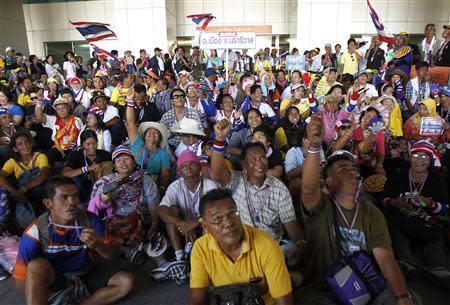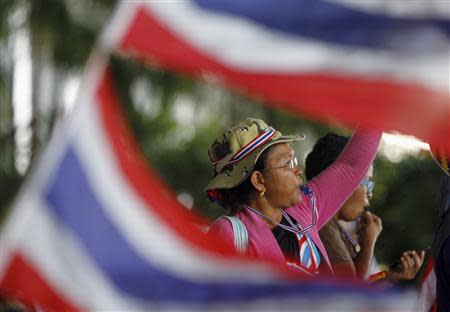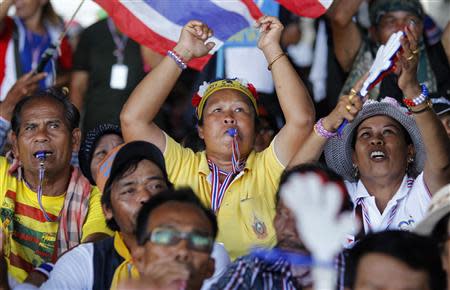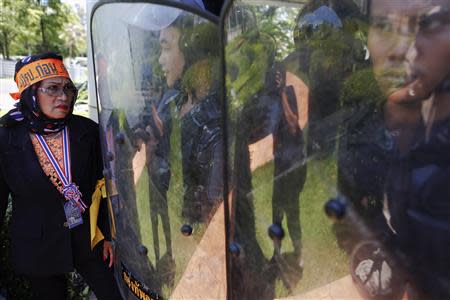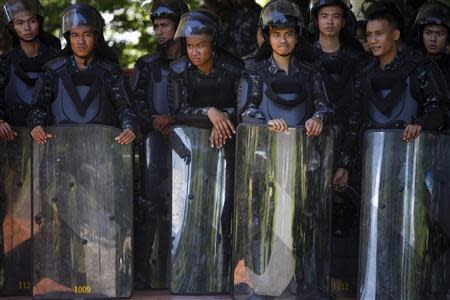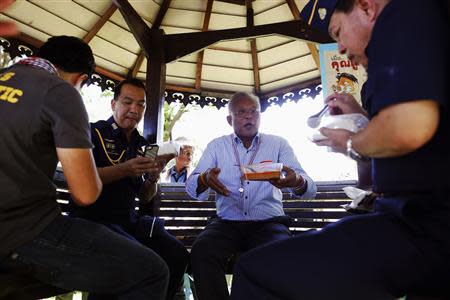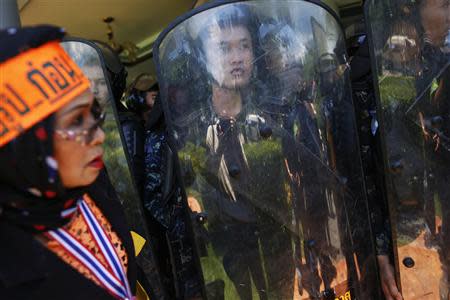Thai July election unlikely as renewed unrest grips Bangkok
By Amy Sawitta Lefevre BANGKOK (Reuters) - A Thai general election is unlikely to go ahead in July after renewed unrest, officials said on Thursday, as the acting prime minister was forced by protesters to flee a meeting with electoral officers and gunmen killed three people in Bangkok. The turmoil comes as a government loyal to ousted former Prime Minister Thaksin Shinawatra squares off with opponents backed by the royalist establishment over who should be prime minister in the latest phase of nearly a decade of rivalry. Anti-government protesters broke into the grounds of an air force compound where acting Prime Minister Niwatthamrong Boonsongphaisan was meeting the Election Commission to fix a date for new polls, which had been tentatively set for July 20. Commission member Somchai Srisutthiyakorn later told Reuters that date now looked improbable. "We may have to push back the polls," he said. The government sees a general election as the best way out of a crisis that threatens to tip Southeast Asia's second-biggest economy into recession and has even raised fears of civil war. Its enemies know the ruling party would be highly likely to win a poll and want electoral changes aimed at ending the influence of former telecommunications tycoon Thaksin before another vote is held. The renewed tension on the streets raises the prospect that the military - which has stayed out of the crisis so far - could intervene, with the army chief reiterating that an escalation in violence could force it to step in to avoid further bloodshed. SECURITY FEARS Hundreds of protesters converged outside an air force school in north Bangkok after word spread that Niwatthamrong was meeting election officials there. They had put off talks at another venue the previous day because of security fears. "We are here to tell Niwatthamrong that there is no point standing in our way," Chumpol Jumsai, a leader of the anti-government protesters, told the crowd from on top of a truck shortly before hundreds of protesters evaded police and streamed through a side entrance into the compound. Somchai and other commission members met protest leader Suthep Thaugsuban to discuss whether demonstrators would accept a new poll, but failed to reach an agreement. "Even if you set a timeframe of six months or two years (for reforms), I don't believe you can bring about change quickly," Somchai told Suthep. "Will you allow an election to happen in the not-too-distant future?" he asked Suthep, who stuck to his position and emphasized the need for an overhaul of the electoral system. Hours earlier, a small group of men armed with guns and grenades attacked anti-government protesters near Democracy Monument in Bangkok's old quarter, killing two people on the spot, with a third dying later of his wounds. More than 20 people were injured, police said. Paradorn Pattanathabutr, a security adviser to the prime minister, said he suspected the attack was a reaction to pressure by the anti-government side to force the Senate to appoint a new prime minister. It was the most serious incident since five people were killed and dozens wounded in clashes on February 18, when police made their most determined effort to clear the demonstrators. Twenty eight people have been killed and hundreds injured since the protests began in November. The army has a long record of intervening in politics but military chiefs have stayed aloof from this crisis, insisting that politicians must sort out the dispute. However, more violence would raise the possibility of the military feeling compelled to restore order. "The army may have to use troops to calm the situation down if any group harms people," army chief Prayuth Chan-ocha told reporters. "SEIZE POWER" Thaksin won huge support among the rural and urban poor but made enemies of the Bangkok-based elite who saw him as corrupt and authoritarian, and accused him of being disrespectful to the monarchy. Thaksin denied that, but he was deposed in a 2006 coup and has lived abroad since 2008 to avoid a jail term for graft charges that he says were politically motivated. Nevertheless, he has exerted influence through his loyalists including his sister, Yingluck Shinawatra, who led a pro-Thaksin party to a resounding election victory in 2011. Yingluck lost her job as prime minister last week when the Constitutional Court ruled she had abused her power, but her caretaker government remains in office. The anti-government protesters say Thaksin wins elections through money politics and they want the Senate to depose the remnants of Yingluck's caretaker government through the appointment of a "neutral" interim prime minister. "If, by Friday ... the Senate fails to come up with a solution, then the people may have to seize power and set up a people's assembly on their own," Suthep, a former deputy prime minister in a pro-establishment government, told supporters late on Wednesday. The Shinawatras' "red shirt" supporters, who are holding a sit-in protest on Bangkok's western outskirts, have warned of violence if the caretaker government is ousted. "Suthep has said he will seize power for the people. Well, if he seizes power, then we will take it back," Natthawut Saikua, a leader of the pro-government activists, told Reuters. (Additional reporting by Apornrath Phoonphongphiphat and Aukkarapon Niyomyat; Writing by Robert Birsel; Editing by Alex Richardson and Alan Raybould)

